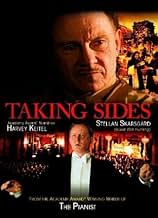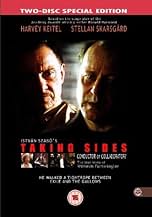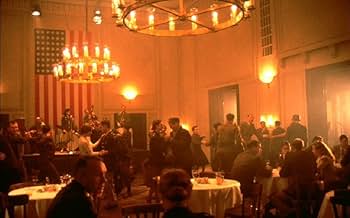Taking Sides
- 2001
- Tous publics
- 1h 48m
After the end of World War II, a famous German conductor is accused of loyalty to the Nazi regime. He argues that art and politics are separate. An investigator thinks otherwise.After the end of World War II, a famous German conductor is accused of loyalty to the Nazi regime. He argues that art and politics are separate. An investigator thinks otherwise.After the end of World War II, a famous German conductor is accused of loyalty to the Nazi regime. He argues that art and politics are separate. An investigator thinks otherwise.
- Awards
- 9 wins & 3 nominations total
Featured reviews
The Major pursues Furtwangler like a rabid dog, determined to show that that Furtwangler was guilty of something.Why didn't Furtwangler leave when he had the chance? Did he seek out accolades from the devil?
Why is Major Arnold so Angry? It it the anger of a small man who feels spat upon by life, suddenly given the chance of bring down someone once so High and Mighty?
FurtWangler is aloof, distant, full of easy platitudes about the redemptive quality of Art. Major Arnold is mean and streetwise, quick to attack and condemn those who he does not understand.
Who is in the wrong? In the end does it mean anything to believe you are right? In whose eyes anyway? This film asks some difficult questions about how we perceive ourselves and others, how we question our most basic motives. Very Good.
Wilhelm Furtwangler was a world-heralded conductor before World War II. Along with a handful of European podium titans - Mengelberg, Walter, Klemperer and Toscanini - these men in essence controlled classical music, both with regard to concert programming and the rapidly developing technological advances of the phonograph disc.
With the rise of fascism, some conductors, composers and musicians fled the grasp of tyrannous regimes. A few, like Toscanini, had little choice (a beating administered by Italian thugs as payment for his refusing to honor Mussolini from the stage was a fair indication that New York offered better prospects). Walter and Klemperer decamped, their careers boosted by their strong anti-Nazi stances. Mengelberg collaborated, essentially ruining his career when victory came (his is a complex case still debated).
Furtwangler, with many opportunities to leave, didn't. Indeed his conducting during the Third Reich was without doubt the hallmark of German classical music during those twelve indescribably dark years. Why didn't he leave? He knew that culture was being obliterated by the stroke of a pen or a dictator's speech. Mendelssohn, whose works he had often performed, was now a non-existent presence in German music. Beethoven and Bruckner, composers Furtwangler loved, were deified for political purposes. Did he believe his presence would preserve essential elements of the German music heritage until a better day?
"Taking Sides" addresses Furtwangler's role and focuses, with flashbacks, on an American major's investigation - shrill, unsophisticated, uncultured American Philistine at its best (worst?) - of Furtwangler's role. A former insurance investigator called to the colors, Harvey Keitel's major is effective as the kind of American officer that many of us have encountered overseas, usually with embarrassment. He is a tenacious bulldog gripping on to a prey he can never truly understand. And he doesn't want to anyway. His savage, histrionic pursuit of Furtwangler blurs the portrayal of the complex conductor.
Stellan Skarsgard is Furtwangler, alternately triumphant on the podium, disturbed by inner doubts and mortifyingly humiliated by the major's treatment which would have been appropriate for investigating a Gestapo officer or a concentration camp commandant. The rest of the cast acts well but their supportive and in some instances distractive roles add little.
A romance between an idealistic American lieutenant who proclaims he is a man of culture before he is a Jew and a winsome fraulein is unrealistic, is irrelevant, not even interesting. "Taking Sides" is a somewhat less sophisticated descendant of Spencer Tracy and Maximillian Schell's blazing encounter in "Judgment at Nuremberg" Schell, acting the part of a judge in Nazi Germany who slowly accepted the abnegation of the rule of law, was forced to confront his true contribution to evil. Spencer Tracy saw to that and, in any event, Harvey Keitel is no Tracy.
Furtwangler in the film is never suspected, much less accused of any crime other than being a championed symbol of German "kultur." That was not a war crime and in reality figures like Furtwangler and composer Richard Strauss (another difficult case) were processed through denazification proceedings fairly quickly and usually were cleared. Some were not (Mengelberg, for example).
The problem with "Taking Sides," beyond its simplistic polarization, is that it does not address, and perhaps could not, the complexity of the role of classical music and musicians in the ideology of Nazism. Furtwangler may not have known of extermination camps and he certainly hurt no Jews (indeed, the record is clear that he saved some Jewish musicians as did Mengelberg) but he must internally have abhorred the Nazi extinction of music by composers such as Mendelssohn and contemporary composers whose works were denounced as "entartete musik" (degenerate music). And more than a few of the composers in the latter class were murdered during the regime. Furtwangler definitely knew that composers and musicians disappeared with no forwarding addresses.
Keitel and Skarsgard act out a morality inquisition that does provoke the viewer to think and question but the ultimate issue, should Furtwangler have fled, is irritatingly vague. Did Furtwangler "take sides" in any meaningful sense? Did he stay beyond the point where leaving was an option? Maybe. Can we, should we, expect composers and conductors to be like Leonard Bernstein, outspoken advocates on every issue? Is that fair?
German conductors had powerful patrons and without doubt Furtwangler's brilliant conducting served the interests of both the leaders and audiences that hungered, through bombings and the approach of defeat, for some relief through music. I have a recording of Furtwangler conducting Beethoven's magisterial Ninth Symphony in Berlin where anti-aircraft fire and bombs can be heard. What did it take for Londoners and Berliners to listen to great music at their imminent mortal peril? "Taking Sides" could have explored the almost mystical relationship between Furtwangler and his audiences. It doesn't really do that although the adulation in which he was held is depicted.
A very fine biography by Shirakawa, "The Devil's Musician," largely rescues Furtwangler from accusations of sympathy with the Nazi regime and he clearly was a much finer fellow than his young rival, Herbert von Karajan. Von Karajan was destined to be a great conductor but he was also a first-class careerist who joined the Nazi party to advance his prospects (and lied about it for years until confronted with the evidence).
Anyone seriously interested in classical music during the Third Reich must read Douglas Kater's three-volume, well-written and extensively researched history of that period. For now, "Taking Sides" is good but not great drama. Selections of music by Bruckner and Beethoven as well as by Glenn Miller and George Gershwin (the latter two decidedly not Nazi favorites) are prominent. Hopefully the movie will impel those unfamiliar with an unsurpassed interpreter of wonderful music to seek out readily available and gripping recordings.
7/10.
What I'd like to note is that this is a film of a dying breed. It is truly educational and stimulates our systematically dumbed down intellect ( as also Szabo's older film "Mephisto" ). It's when reading the comments of other viewers that one realizes that there are still people out there that can appreciate film as a vehicle of dialectic and whose insightful observations add to our collective learning experience. Thank you.. it is SUCH a pleasure to read your comments.
dvoulio
For example: there are frequent references in the dialogue to Furtwängler's rival, Herbert von Karajan ("Little K.") Why did the Americans attack Furtwängler, and not von Karajan, who was an ardent Nazi? Furtwängler was prevented from conducting in the U.S., while von Karajan was lionized. Perhaps the makers of this film thought that the implications of this were too big to be discussed in the film. I'm sure that they didn't even want to go near the fact that the people who ran the de-nazification program were Americans with close ties to the Nazis themselves.
Also, Furtwängler's rationale for staying in Germany was somewhat more philosophical than the film implies. He thought he was defending the legacy of Mozart, Beethoven et al against the Nazis, and that this was a sacred responsibility. A bit of this comes out in the film, but in a superficial way.
With respect to the success of the film otherwise, Stellan Skarsgaard is excellent as Furtwängler, even managing to resemble him somewhat. I think that Harvey Keitel is somewhat hampered by the script -- the film would have been more successful if Keitel had come off as more conflicted and less one-dimensional. Clearly the director wished to imply that Keitel was conflicted, but that, as a military man, he was required to toe the line -- the frequent shots of Army indoctrination films (about how bad the Germans were) were intended to provide a rationale for Keitel's behavior. But the film would have been more compelling if Keitel were given an opportunity to express more doubts about what he was being asked to do. I also thought that the ending was a bit anticlimactic.
Did you know
- TriviaTo the criticism of both movie critics and American audiences of depicting the American Denazification officer Maj. Steve Arnolds (Harvey Keitel) as a "caricature, a bully, a Philistine," screenplay writer Ronald Harwood told The Jewish Journal that he went on to comb archives for denazification transcripts and to interview officials who had supervised such proceedings."They were morally brutal," Hardwood stated. "They bullied people, and they did behave in an extreme way. But they had just seen the camps, and no one in the world had seen that before."
- GoofsWhen Major Arnold is listening to the recording of Beethoven's Fifth Symphony, the record finishes the first movement and carries straight on to the second. Long playing albums, which ran at 33 1/3 rpm, were introduced in 1948, but the record shown is a 78 rpm one. The performance of the 5th Symphony would have been on a set of five 78 rpm records, one movement each, split over the two sides. It should not be possible for the second movement to start without the record being changed.
- Quotes
Emmi Straube: When he made his decision, he couldn't have known everything. Especially not the way people like you do, who've returned from exile and feel that you have a right to pass judgement. Because you are blameless, you think you know best who is a sinner and who deserves forgiveness. But you have no idea how people lived here.
- ConnectionsEdited into Taking Sides Again (2004)
- How long is Taking Sides?Powered by Alexa
Details
- Release date
- Countries of origin
- Languages
- Also known as
- Taking sides - Le cas Furtwängler
- Filming locations
- Production companies
- See more company credits at IMDbPro
Box office
- Budget
- $20,000,000 (estimated)
- Gross US & Canada
- $188,952
- Opening weekend US & Canada
- $22,051
- Sep 7, 2003
- Gross worldwide
- $422,832
- Runtime
- 1h 48m(108 min)
- Color
- Sound mix
- Aspect ratio
- 1.85 : 1






















